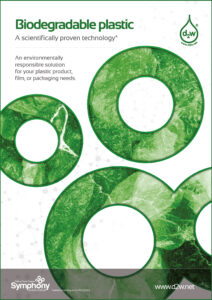 d2w is a masterbatch which, at little or no extra cost, turns ordinary plastic, at the end of its useful life – into a material with a different molecular structure. At the end of the process, it is no longer a plastic, and has changed into a material that is biodegradable in the open environment.
d2w is a masterbatch which, at little or no extra cost, turns ordinary plastic, at the end of its useful life – into a material with a different molecular structure. At the end of the process, it is no longer a plastic, and has changed into a material that is biodegradable in the open environment.
The Process:
- d2w biodegradable masterbatch is added at the manufacturing stage of the plastic product
- Film containing d2w biodegradable masterbatch is extruded and then converted into bags or packaging. This can be done by ordinary plastic factories, with their existing equipment, materials and workforce.
- The product behaves like conventional plastic during its intended service life.
- After its service life, the bag or packaging may be recycled if collected, but :
- If it ends up in the open environment in the presence of oxygen, the d2w additive takes effect and the product begins to degrade.
- The product will then biodegrade in a continuous, unstoppable and irreversible – process leaving nothing more than carbon dioxide, water and biomass behind – no heavy metals, no toxic residues and no microplastics.
Standard
- American ASTM D6954
- (ASTM D600 is not relevant as it applies to biodegradation in the special conditions found in an industrial composting facility. For composting plastics seehttps://www.biodeg.org/subjects-of-interest/composting/
Added Value with d2w®
- Suitable for food contact
- Requires only 1% inclusion rate.
- Works with virgin and recycled plastic.
- Works with PE & PP.
- No change in the manufacturing process.
- Does not lose any of its original properties during its useful life.
- Customers receive full support from Symphony’s Technical and Marketing teams
Click on the image below, to download a copy of the d2w brochure:
Scientific studies:
d2w has been studied by scientists for at least 25 years. the latest, and most important studies are Oxomar, Queen Mary university London (QMUL), and the European Chemicals Agency (ECHA).
Oxomar was a three-year study on plastics in the marine environment, sponsored by the French Government, at l’Obervatroire Oceanalogique de Banyul Sue Mer. It concluded that plastic made with Symphony’s d2w technology will biodegrade in seawater significantly more efficiently than conventional plastic.
Following this study, the Oxomar scientists allowed bacteria commonly found in the open environment access d2w plastic film containing Carbon 13. They found Carbon 13 in the CO2 exhaled by the bacteria, proving beyond doubt that the plastic had been bio-assimilated by the bacteria.
Queen Mary University London reported in February 2020 that plastic products containing a d2w masterbatch will become biodegradable much more quickly than ordinary plastic if they get into the open environment at the end of their useful life and will then be biodegraded by bacteria commonly found in soil and in the marine environment, up to 90 times faster than ordinary plastic.
European Chemicals Agency – In 2017 the EU Commission referred oxo-biodegradable plastic to ECHA because it was concerned that it might create microplastics. ECHA made a call for evidence, and after studying many hundreds of pages of evidence, including evidence from Intertek https://www.biodeg.org/wp-content/uploads/2021/01/Intertek-Report-to-ECHA-24.5.18.pdf concluded on 30th October 2018 that it was not convinced that microplastics were formed.
Recycling
This European recycling study from Austria in July 2016 confirms that thick cross-section products made with d2w technology can be safely recycled. TCKT are the European specialists in application-oriented research and development in plastics engineering. This is the fourth positive study.
This is the fourth positive study. TCKT had itself reported in March 2016 TCKT Report that recyclate from d2w biodegradable plastic can safely be used in thin plastic film products. Other positive studies have been done by Roediger Laboratories in South Africa, and in 2012, a peer-reviewed study was published in Polymer Degradation & Stability showing that all mixtures of oxo-biodegradable plastics in the stabilized LDPE displayed estimated service lives of at least 10 years despite having significantly higher contents of OBDs than may be experienced in real life.
Separate collection is not therefore necessary, for recycling at scale, but separation can easily be achieved if so desired by including an optical tracer in the d2w masterbatch.
For recycling generally see https://www.biodeg.org/subjects-of-interest/recycling-2/
For more information and videos click on the link:
https://www.symphonyenvironmental.com/additives/biodegradable-plastic/

